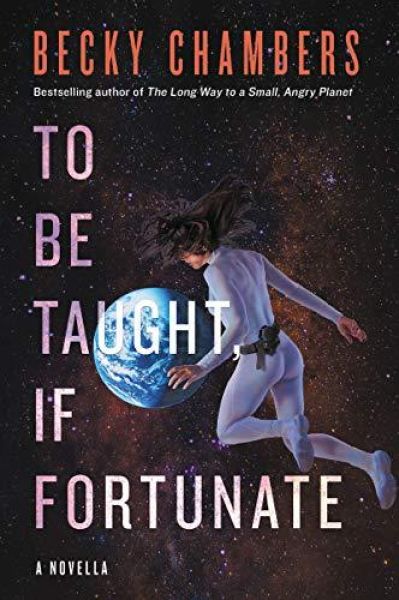Straight On To Morning
To Be Taught, if Fortunate
By Becky Chambers

15 Aug, 2019
To Be Taught, if Fortunate is a standalone hard-SF novella from Becky Chambers.
Flight engineer Ariadne O’Neill and mission specialists Elena Quesada-Cruz,
Jack Vo, and Chikondi Daka have been dispatched aboard the OCA spacecraft Merian to the red dwarf star Zhenyi (BA-921), just which is a mere fourteen light-years from Sol.
Faster than light drives do not exist and neither does terraforming. Instead, the explorers must depend on somaforming, a technologically induced metamorphosis that will adapt them to the worlds they visit.
Their mission is to examine potentially life-bearing worlds: the icy moon Aecor and the terrestrial planets Mirabilis, Opera, and Votum. Rather than settle for mere orbital examination followed up with expendable probes, they are expected to land on each world in turn, while also limiting the degree to which they contaminate the unfamiliar planets.
Just getting to the system took almost thirty years, albeit years the travellers dreamed away in cold sleep. Exploring each world will take years more. Life, it seems, is no rare thing. Each world has its native lifeforms (biochemically distinct from all the others) and each lifeform requires careful, painstaking cataloging.
Time enough to reach and study each world is time for Earth to change in alienating ways. The travellers have fast-forwarded through a generation of history. Each new update from Earth reveals a world increasing unfamiliar to them. It’s very disturbing.
But not as disturbing as it is when Earth falls utterly silent.
~oOo~
BA-921 does not appear to correspond to any currently known system that is fourteen light-years from the Sun. But since it’s a red dwarf and we’re discovering new, nearby red dwarfs all the time, I am inclined to give the author a pass on this. Similarly the tale is told from the perspective of an engineer (O’Neill) so, while there were some worldbuilding details that made me scratch my head, it’s possible that the engineer misunderstood what the ecologists were saying but was too proud to get a clarification.
O’Neill seems to hate cities, but this may reflect her tastes (space traveler, inured to long isolation) rather than any defect in the cities she has encountered. Or it could be that SF just hates cities. I can think of any number of novels in which cities are hellholes, or shiny dystopias, or whatever it is that drives protagonists to escape them,
No need to wonder why Earth sent fragile humans, when robot probes and telescopes would be much cheaper. The book says:
And while probes and space telescopes shed ever more light on our galactic neighbourhood, there’s only so much you can see looking through a peephole. To properly survey a place, you need boots on the ground1. You need human intuition. You need eyes that can tell when something that looks like a rock might be more than a rock.
Well, that’s the author’s POV. The Mars rover Curiosity might differ.
I understand that SF readers might want to read about living protagonists so as to identify with them. [Editor’s note: Murderbot?] Still, given that explorers must isolate themselves to prevent contamination and will probably find themselves driving sealed ATVs or wearing Extra-Vehicular Activity Suits, I cannot see that this is all that different from looking at a camera feed.
Author gets points for imagining somaform adaptations that are specific to a particular environment. There’s no handwaving magic that will allow a somaformed human to live anywhere.
Given that part of the backstory for this novella is a two-generation-long hiatus in space travel due to climate change, somaforming seems like the sort of tech that would likely have been developed for purely terrestrial applications or once developed for space, would have been avidly adapted for the Earth.
I am oddly unenthusiastic about this novella. It’s a familiar sort of story, to which Chambers doesn’t really bring much new. I have enjoyed the characters, character development, and character interaction in her novels, but there’s little of that here. It’s another bland story about exploration and the occasional horrible discovery.
To Be Taught, if Fortunate is available here (Amazon) here (Amazon.ca), and here (Chapters-Indigo).
1: One of the target worlds is an ocean world. Local conditions (almost no land and extreme weather) turn out to be just a bit beyond what the crew can deal with. Ah well.
